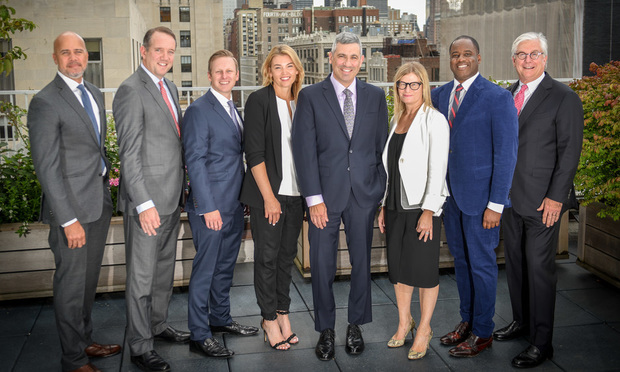Legal Departments of the Year: Endeavor
"Having a firm that knows us extremely well and that we trust means that we waste less time in managing the relationship; in each transactional or litigation matter, no matter how complex or fast-moving, we have experienced teams who can 'hit the ground running.'”
October 01, 2018 at 02:03 PM
4 minute read
 From left: Dan Limerick, head of business affairs, Endeavor; John Cooper, SVP and deputy general counsel, IMG; Joel Karansky, SVP, deputy general counsel and corporate secretary, Endeavor; Courtney Braun, SVP and deputy general counsel, Endeavor; Seth Krauss, chief legal officer, Endeavor; Rebecca Sanhueza, SVP and deputy general counsel, IMG and Endeavor Content; Riche McKnight, SVP, deputy general counsel and global head of litigation, Endeavor; and Tom McGuire, business affairs, WME.
From left: Dan Limerick, head of business affairs, Endeavor; John Cooper, SVP and deputy general counsel, IMG; Joel Karansky, SVP, deputy general counsel and corporate secretary, Endeavor; Courtney Braun, SVP and deputy general counsel, Endeavor; Seth Krauss, chief legal officer, Endeavor; Rebecca Sanhueza, SVP and deputy general counsel, IMG and Endeavor Content; Riche McKnight, SVP, deputy general counsel and global head of litigation, Endeavor; and Tom McGuire, business affairs, WME.
Best Legal Department for Outside Counsel Management
Q: How is the role of general counsel evolving, and how have you adapted?
A: It's a very exciting time to be a general counsel. We are increasingly seen as key members of the corporate decision-making team. While our role still requires us to safeguard the company via compliance, litigation and corporate governance efforts, we are also being asked to help inform core business strategy on a global basis. We have oversight over formerly core business areas, like government relations, and are asked to proactively weigh in on countless business matters of concern. During an average day, I may be asked to advise on data security, crisis management, global geo-political issues, HR issues, investor relations and business strategy. Being at a company that has embarked on a rapid worldwide expansion, I also spend a great deal of time evaluating transactional risks. A common thread is the need for great judgment.
Q: How do you find it most effective to develop leadership skills, and to foster them in others?
A: It's critically important to install lawyers in top in-house positions with leadership abilities, who exhibit a “can do” mindset, who see themselves as true business partners as well as a control function. It's just as important to nurture your staff and their platforms to position each for success … every role needs a defined platform, whether very narrow or very broad, and business buy-in for its existence. It's also important to offer formal and informal trainings that give younger lawyers the concepts and tools to succeed and lead in their increasingly complex roles. As part of that, our junior lawyers are assigned to work in teams with their business-side peers and colleagues across the company.
Q: What is the most effective time-management tool or technique you employ?
A: It's critically important that you ensure your time is focused on what's important. We all know how to focus on what's on fire, but too often some of those “urgent” matters are not important matters and they take your time and focus away from critically important matters that are not yet “on fire” …. More broadly, it's really helpful to find partners for your department and company who are invested in its success. As an example, we have an incredibly close collaboration with Paul, Weiss—for many of our most critical, sensitive and fast-moving matters. Having a firm that knows us extremely well and that we trust means that we waste less time in managing the relationship; in each transactional or litigation matter, no matter how complex or fast-moving, we have experienced teams who can “hit the ground running.”
Q: What is your best advice for in-house lawyers trying to make an impact, with their corporate clients and beyond?
A: I advise younger lawyers to go both broad and deep; broad, in that you need to be a consummate generalist, with work experiences in a variety of settings and within a variety of business units. Stretch yourself in each case, and don't be afraid to take risks. But you also need to go deep, to become the best lawyer you can. In my career, for example, I worked my way up first in the Manhattan DA's office, ultimately becoming part of the team that prosecuted two major NY-based banks for each's role in Enron's collapse. Then I moved to Wall Street, working my way up the in-house ladder before jumping at an opportunity to become the general counsel of a publicly listed video-game developer in the midst of a stock-options back-dating scandal.
This content has been archived. It is available through our partners, LexisNexis® and Bloomberg Law.
To view this content, please continue to their sites.
Not a Lexis Subscriber?
Subscribe Now
Not a Bloomberg Law Subscriber?
Subscribe Now
NOT FOR REPRINT
© 2025 ALM Global, LLC, All Rights Reserved. Request academic re-use from www.copyright.com. All other uses, submit a request to [email protected]. For more information visit Asset & Logo Licensing.
You Might Like
View All
Benjamin West and John Singleton Copley: American Painters in London
8 minute read
'A Regressive Institution': SDNY Judge Rakoff Delivers Pointed Remarks on SCOTUS in Recent Appearance
2 minute read
Federal Court That Faces Its Share of Real-Life Horrors Gets Into Halloween Spirit
1 minute readTrending Stories
- 1'A Death Sentence for TikTok'?: Litigators and Experts Weigh Impact of Potential Ban on Creators and Data Privacy
- 2Bribery Case Against Former Lt. Gov. Brian Benjamin Is Dropped
- 3‘Extremely Disturbing’: AI Firms Face Class Action by ‘Taskers’ Exposed to Traumatic Content
- 4State Appeals Court Revives BraunHagey Lawsuit Alleging $4.2M Unlawful Wire to China
- 5Invoking Trump, AG Bonta Reminds Lawyers of Duties to Noncitizens in Plea Dealing
Who Got The Work
J. Brugh Lower of Gibbons has entered an appearance for industrial equipment supplier Devco Corporation in a pending trademark infringement lawsuit. The suit, accusing the defendant of selling knock-off Graco products, was filed Dec. 18 in New Jersey District Court by Rivkin Radler on behalf of Graco Inc. and Graco Minnesota. The case, assigned to U.S. District Judge Zahid N. Quraishi, is 3:24-cv-11294, Graco Inc. et al v. Devco Corporation.
Who Got The Work
Rebecca Maller-Stein and Kent A. Yalowitz of Arnold & Porter Kaye Scholer have entered their appearances for Hanaco Venture Capital and its executives, Lior Prosor and David Frankel, in a pending securities lawsuit. The action, filed on Dec. 24 in New York Southern District Court by Zell, Aron & Co. on behalf of Goldeneye Advisors, accuses the defendants of negligently and fraudulently managing the plaintiff's $1 million investment. The case, assigned to U.S. District Judge Vernon S. Broderick, is 1:24-cv-09918, Goldeneye Advisors, LLC v. Hanaco Venture Capital, Ltd. et al.
Who Got The Work
Attorneys from A&O Shearman has stepped in as defense counsel for Toronto-Dominion Bank and other defendants in a pending securities class action. The suit, filed Dec. 11 in New York Southern District Court by Bleichmar Fonti & Auld, accuses the defendants of concealing the bank's 'pervasive' deficiencies in regards to its compliance with the Bank Secrecy Act and the quality of its anti-money laundering controls. The case, assigned to U.S. District Judge Arun Subramanian, is 1:24-cv-09445, Gonzalez v. The Toronto-Dominion Bank et al.
Who Got The Work
Crown Castle International, a Pennsylvania company providing shared communications infrastructure, has turned to Luke D. Wolf of Gordon Rees Scully Mansukhani to fend off a pending breach-of-contract lawsuit. The court action, filed Nov. 25 in Michigan Eastern District Court by Hooper Hathaway PC on behalf of The Town Residences LLC, accuses Crown Castle of failing to transfer approximately $30,000 in utility payments from T-Mobile in breach of a roof-top lease and assignment agreement. The case, assigned to U.S. District Judge Susan K. Declercq, is 2:24-cv-13131, The Town Residences LLC v. T-Mobile US, Inc. et al.
Who Got The Work
Wilfred P. Coronato and Daniel M. Schwartz of McCarter & English have stepped in as defense counsel to Electrolux Home Products Inc. in a pending product liability lawsuit. The court action, filed Nov. 26 in New York Eastern District Court by Poulos Lopiccolo PC and Nagel Rice LLP on behalf of David Stern, alleges that the defendant's refrigerators’ drawers and shelving repeatedly break and fall apart within months after purchase. The case, assigned to U.S. District Judge Joan M. Azrack, is 2:24-cv-08204, Stern v. Electrolux Home Products, Inc.
Featured Firms
Law Offices of Gary Martin Hays & Associates, P.C.
(470) 294-1674
Law Offices of Mark E. Salomone
(857) 444-6468
Smith & Hassler
(713) 739-1250







